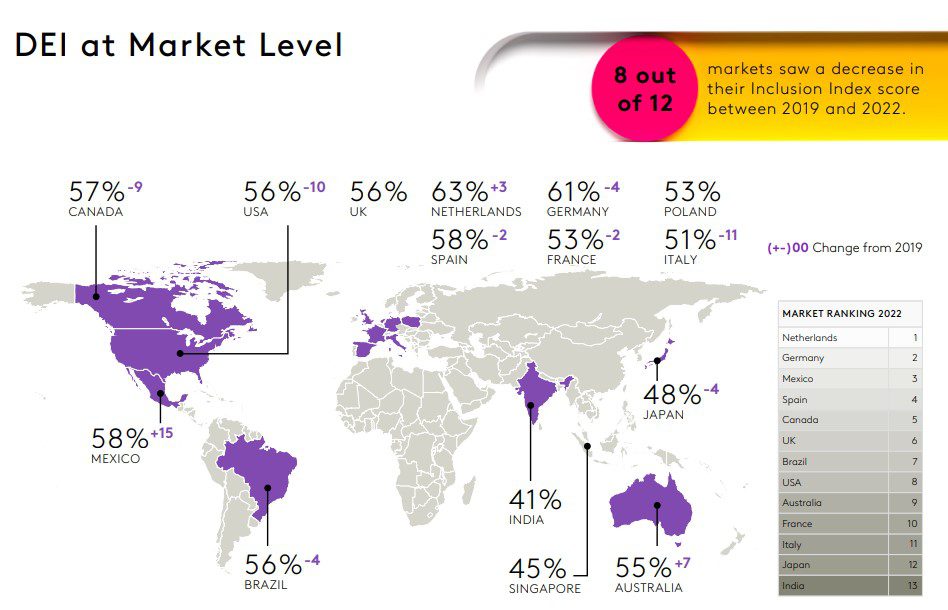Kantar: It’s time for bold action on D,E&I
Progress has stalled since 2020.
Why You Should Care
D,E&I is good for business bottom lines.
But progress has stalled over the past two years.
Urgent action is needed to get organizations back on track.
Diversity, equity and inclusion (D,E&I) has rocketed up the agenda over the past few years.
Diversity of thought and psychological safety have been proven to be good for business. At the end of day, when employees feel safe to share their differing views and perspectives that leads to ideation and innovation.
While many employers talk the talk on D,E&I, data from Kantar shows that, in reality, progress is slow and stalling.
Kantar talked to 13,000 employees from 13 countries and 24 industries to find out their lived experience of D,E&I at work.
The results showed that eight out of 12 markers saw a decline in their inclusion score since 2019. The biggest drops were in the US, Canada and Italy.
Canada’s drop is noteworthy as it had the top spot in the index in 2019 but, just three years later, is now in fifth place.

Kantar, 2022 Inclusion Index.
In terms of industries, less half of them reached the global average score of 55%. The worst performing sectors included the media, security and defense, agriculture and entertainment, while personal services, not-for-profit and professional performed best.
Kantar’s data further showed that while 71% employees believe that their organization is taking steps to be more diverse and inclusive, 46% said their employer needed to do more.
Talking about the research, Kantar’s inclusion lead Nadach Musungu tells UNLEASH: “The most striking findings from the report is that organizations still have a long way to go when it comes to inclusion in the workplace.
“Those from underrepresented groups reporting a measurably poorer experience at work e.g. gender (-2%), race and ethnicity (-4%), religion (-9%), LGBTQ+ (-15%) and those with disabilities (-29%) all score below the global average inclusion score of 55%.”
Kantar’s data found that one in four of employees from ethnic minorities surveyed said they have been made to feel uncomfortable in the workplace, while one in two of workers who identify as disabled felt they were restricted from career progression opportunities.
One third of LGBTQ+ respondents said they had been bullied or undermined at work, while 49% of women had experienced colleagues taking sole credit for shared efforts.
How to create more inclusive workplaces
Kantar is very clear that employers need to hear these hard truths and take bold action. It is particularly urgent given that the data shows a link between a lack of progress on D,E&I and high attrition rates.
One in four of the 13,000 employees surveyed are likely or highly likely to leave their organization because of the lack of inclusion – this is up three percentage points since 2020 and rises to 34% for employees aged under 35.
“With such an impact to the bottom line, organizations cannot afford to ignore the importance of D,E&I,” notes Musungu.
To tackle these challenges head on, Musungu explains that “HR leaders need to ensure they are driving systemic change by putting in place robust data measurement, setting targets and sharing these with the wider organization to create accountability, transparency and trust.”
According to Kantar, employers must start by collecting the data to understand the state of state of inclusion in their organizations), then be guided by the data in decision-making. It is crucial that employers know where they are doing well, and where they need to improve.
They then to create an action plan about how to correct the issues, followed by tracking and measuring progress around inclusion at work. Remember, you can’t manage or improve what you can’t measure.
The International Festival of HR is back! Discover amazing speakers at UNLEASH America on 26-27 April 2023.
Sign up to the UNLEASH Newsletter
Get the Editor’s picks of the week delivered straight to your inbox!

Chief Reporter
Allie is an award-winning business journalist and can be reached at alexandra@unleash.ai.
